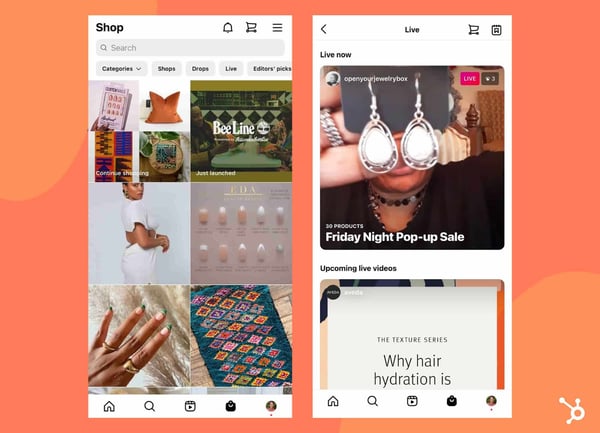B2B & B2C Instagram Marketing Trends of 2022 [Data from 500 Marketers]
When it comes to social media, there are a lot of differences in which channels B2C and B2B brands prioritize.
According to HubSpot Blog Research surveying 500+ marketers in 2021, 75% of B2B businesses currently leverage Facebook compared to only 66% of B2C.
60% of B2C businesses leverage YouTube, 24% more than B2B businesses. For Twitter, the same is true – it’s more popular among B2C brands than B2B businesses.
When we narrow it down to Instagram, how do they compare? Let’s dive into the key differences between B2C and B2B brands on the social platform.
B2B Trends and Tactics
Better Success with Influencer Marketing
When it comes to influencer marketing, B2B companies are reporting much higher return on investment than B2C companies. In fact, 25% of B2B marketers say it’s the marketing strategy they plan to leverage the most in 2022, compared to only 10% of B2C marketers.
When asked to rank the ROI of partnering with influencers, 70% of B2B marketers say it offers high ROI compared to only 51% of B2C marketers. Most B2C brands report average ROI from this strategy.
As a result of this, 68% of B2B marketers plan to increase their investment in influencer marketing in 2022.
However, when we look at partnering with brands and accounts with similar audiences, things shift.
B2C marketers are having better luck – 51% report high ROI, 12% more than B2B marketers.
More Branded Hashtag Trends and Challenges
While the research shows that both B2C and B2B brands are leveraging hashtags at the same rate, B2B brands seem to be getting better results.
12% of B2B marketers say this strategy has resulted in the biggest ROI, compared to only 7% of B2C marketers.
In addition, roughly 96% of B2B marketers plan to continue or increase their investment in branded hashtag trends and challenges.
A Focus on Educational and Authentic Content
When asked to rank their top-performing strategies on Instagram, most B2B brands ranked educational content pretty low. It fell behind most strategies including IG shopping tools, creating engaging content, audience interaction, and ad campaigns.
Only 4% of B2B marketers say it offered the highest ROI.
Despite this, 68% plan to increase their investment in creating educational or informative content.
Meanwhile, 46% of B2C marketers plan to do the same. This is likely because, for many B2C brands (27% specifically), 2022 will be the first time they leverage this strategy.
Authentic, behind-the-scenes content is another big play for B2B brands. They plan to leverage this content type 16% more than B2C brands, according to our research.
We know why – 16% of B2B marketers say this content type has resulted in the biggest ROI in 2021, compared to only 6% of B2C marketers.
So, while most B2B marketers (63%) plan to increase their investment in this content type, 10% of B2C will be decreasing it. In fact, it’s the content type with the highest divestment percentage for B2C brands.
B2C Trends and Tactics
Higher Priority on Customer Service
B2C brands are leveraging Instagram for customer service more than B2B brands – 14% more to be exact.
Wondering why? Two reasons.
The first is that it aligns with their business goals. Roughly 27% of B2C marketers say improving customer service and retention is one of their primary goals on Instagram and will continue to be in 2022.
The second reason is that this strategy is paying off.
44% of B2C marketers say leveraging IG for customer service offers high ROI and 51% say average ROI.
More Use of Shopping Tools
In 2022, 34% of B2C brands are focused on advertising their products and services, compared to only 22% of B2B brands.
Knowing this data, it makes sense that Instagram’s shopping tools are more popular among B2C brands.

In addition to aligning with their goals, 48% of B2C marketers say it offers a high ROI. In fact, y it’s their best performing Instagram strategy along with leveraging the platform for customer service.
Despite these promising numbers, not all B2C brands have been trying out this strategy. For 37% of B2C marketers, 2022 will be their first time doing so.
Another reason why these shopping tools aren’t more popular with B2B brands is the revenue. 48% of B2B marketers say the biggest challenge they face is that it doesn’t generate enough sales.
An Emphasis on a Consistent Brand Voice
Thirty-six percent of B2C brands say a lack of a consistent aesthetic or voice has caused them to lose followers – 10% higher than for B2B brands.
42% plan to leverage this for the first time in 2022. However, those who use it say it’s the second-highest performing marketing investment behind creating content that encourages engagement.
In addition, 16% of B2C marketers say it’s the marketing strategy they’ll invest the most in, compared to only 9% of B2B brands.
Although B2B and B2C brands mostly intersect in their top goals, how they use the platform differs greatly.
![]()


![New Data: Instagram Engagement Report [2022 Version]](https://no-cache.hubspot.com/cta/default/53/9294dd33-9827-4b39-8fc2-b7fbece7fdb9.png)
